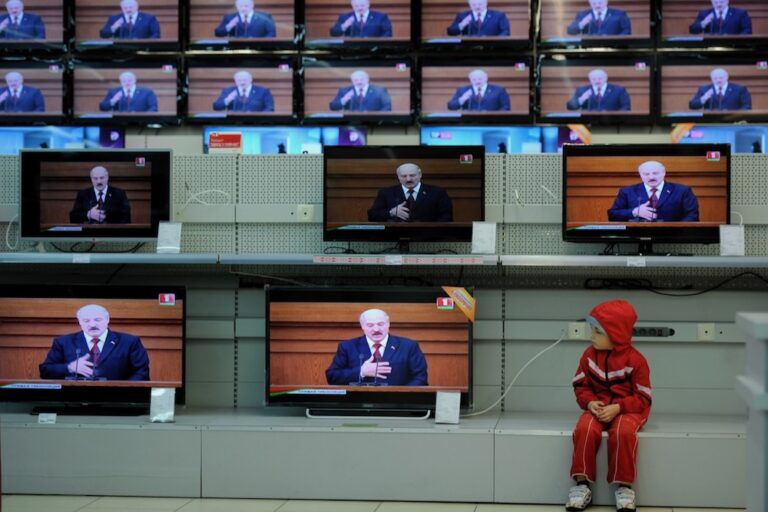(RSF/IFEX) – RSF has denounced the Belarusian authorities’ ban on the Russian television station NTV and restrictions placed on an American media aid organisation, describing the moves as “new blows to press freedom” in the former Soviet republic. The NTV office was shut down on 8 July 2003 for allegedly slandering the government. Pavel Selin, […]
(RSF/IFEX) – RSF has denounced the Belarusian authorities’ ban on the Russian television station NTV and restrictions placed on an American media aid organisation, describing the moves as “new blows to press freedom” in the former Soviet republic.
The NTV office was shut down on 8 July 2003 for allegedly slandering the government. Pavel Selin, the station’s correspondent in Minsk, the capital, was deported on 28 June for “biased” coverage of the funeral of writer Vasil Bykov, an opponent of President Alexander Lukashenko. The Foreign Ministry had warned the station it would be banned from working in Belarus if it did not apologise on the air for the funeral coverage.
On 7 July, the Foreign Ministry refused to renew the accreditation of Robert Ortega, head of the Minsk office of the International Research and Exchange Board (IREX-Promedia), which organises training seminars for journalists, provides free access to the Internet, hosts the websites of some 30 independent newspapers and makes extensive photo and written archives available to the media.
IREX was accused of carrying out “irregular” activities. The organisation will have to shut down its operations by 7 August if its appeal to the country’s Supreme Economic Court is rejected. Ortega has accused the government of making a political decision as part of its persistent efforts to curb the independent media.
“The banning of NTV will prevent one of the few non-official broadcasting media outlets easily accessible to the public from reporting on events in Belarus,” noted RSF Secretary-General Robert Ménard. “Closing down IREX will cut Belarusian journalists off from valuable sources of information, and independent media may lose their websites,” he added.
“Since the beginning of the year, the authorities have stepped up their campaign to silence the independent media, put pressure on the foreign media and obstruct the work of organisations that encourage media diversity. The latest developments are new blows to press freedom. The situation is increasingly serious,” Ménard said.
On 27 June, the Foreign Ministry asked Selin to explain his 25 June report on the Bykov funeral, in which he said police had deliberately obstructed the 20,000-strong funeral procession and that Bykov’s widow had had her permit to live in Minsk cancelled. His report also highlighted the presence of the red and white Belarusian flag seen at the time of independence, but since banned and now a symbol of resistance to the regime.
Selin said the authorities were also angered over his interview with opposition figure Stanislav Shushkevich, who was Belarus’ first post-independence leader. Shushkevich said Lukashenko had been “afraid to attend the funeral.”


